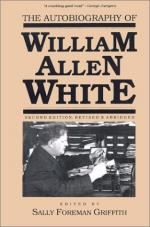|
This section contains 356 words (approx. 2 pages at 300 words per page) |
Encyclopedia of World Biography on William Allen White
William Allen White (1868-1944), American journalist, was a spokesman for small-town America. His folksy wisdom and political commentaries were read and loved by millions.
On Feb. 10, 1868, William Allen White was born in Emporia, Kan. While attending Emporia College and the University of Kansas, he became involved in newspaper work and left, before receiving a degree, to work on various newspapers. After valuable years of experience writing for Kansas City newspapers, in 1895 he purchased the Emporia Gazette, the small-town weekly which he edited for the next 49 years.
The heat of a political campaign soon thrust White, a Republican, into national prominence. He was a virulent foe of the Populists and William Jennings Bryan, and during the presidential campaign of 1896 he published a vitriolic editorial attacking populism entitled "What's the Matter with Kansas"" The Populists, said White, were "gibbering idiots" intent on despoiling the rich and driving business and capital from the state. The editorial was reprinted by various Republican newspapers and magazines, and soon thousands of copies were being circulated in pamphlet form by the Republican campaign committee.
White did not long remain the darling of the conservatives. He soon moved toward progressivism and became a friend and supporter of President Theodore Roosevelt. When Roosevelt bolted the Republican party in 1912 to run on the Bull Moose ticket, White backed him. During World War I White became an ardent supporter of Woodrow Wilson's form of internationalism and fought for American entry into the League of Nations. In the 1920s White battled both the nativist Ku Klux Klan and the urban sophisticates who disparaged rural America. He came to stand for all that was decent and tolerant in small-town America, all the virtues that were rapidly being lost in an industrializing and urbanizing country. During the 1930s he supported most of Franklin Roosevelt's New Deal legislation but voted against Roosevelt in elections.
In 1940 White lent the great weight of his name to an organization lobbying for American support for the opponents of Nazism in Europe. "The Committee to Defend America by Aiding the Allies" became popularly known as the "White Committee." He died on Jan. 31, 1944, in Emporia.
|
This section contains 356 words (approx. 2 pages at 300 words per page) |


